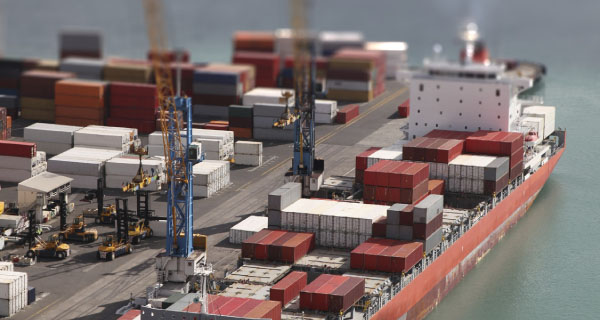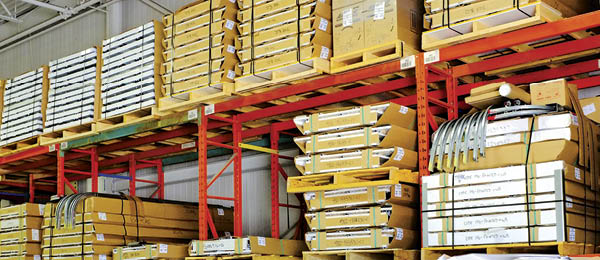
SaaS-Based TMS Empowers Global Freight Management
Q: What are the biggest challenges facing shippers in today’s economic environment? A: In today’s volatile market, managing transportation domestically and globally is a key factor for a more efficient and cohesive supply chain. Many businesses still use manual methods to manage freight, with no way to measure service or performance. Other companies are bound […]
Read More
Loading Dock Safety: No More Risky Business
Busy loading docks can create a dangerous work environment. But recent advances in dock safety technology help keep workers safe on the job.
Read More
Urban Delivery: Getting Into the Grid
Traffic congestion and infrastructure limitations complicate delivery in major cities, but expedited carriers use network engineering, communication tools, and contingency planning to ensure they meet shipper needs.
Read More
Thinking Small: The Business Case for LCL
Using less-than-containerload (LCL) services to ship smaller ocean freight volumes can reap large benefits.
Read More
Lift Truck Strategies Raise the Bar
Materials handling automation and warehouse technology are transforming forklift fleets into competitive weapons—and distribution facilities into finely tuned, demand-responsive machines.
Read More
Inbound Transportation Management and Control: Why It’s Important and How to Grab It
Do inbound shipments just seem to appear on your dock? Here’s how to seize control.
Read More
Inbound Logistics’ Summer Reading Guide 2012
Whether you brush up on fundamental logistics concepts, or explore emerging warehousing, sustainability, and procurement trends, you’ll be brighter than ever after dipping into these supply chain bestsellers.
Read More
Canada Trade: Driving Growth Northward
Increasing demand for U.S. goods in Canada represents a positive sign for the economies of both countries. But keeping cross-border shipments moving requires building smart and savvy logistics partnerships.
Read More
Co-locating Reverse and Forward Logistics Unlocks Value of Returns
Q: Why is reverse logistics an important function in today’s consumer electronics supply chain? A: Companies are trying to extend product lifecycles, as well as maximize asset recovery value. If they spend money to make a product, they want to recapture as much of the original cost as possible. Consider that 65 to 70 percent […]
Read More
Developing a Comprehensive Transportation Strategy
Q: What advice do you have for companies attempting to optimize their inbound freight? A: It’s worth the effort. Traditionally, companies have focused on low-hanging fruit, such as improving efficiencies and reducing outbound transportation costs. Overlooked is the more difficult task of managing inbound transportation, which can often be multi-modal, multi-leg, and international. Companies need […]
Read More
Readers’ Choice: Top 10 3PL Excellence Awards 2012
What elevates a relationship from a workable collaboration to a truly great partnership? MORE TO THE STORY: 3PLs to Watch About the Survey Respondents Partner Appreciation: A Sampling of Reader Comments We try to describe this elusive state in so many ways: “He just gets me.” “She’s the yin to my yang.” “It’s like he […]
Read More
3PLs Control Loads to Provide Shippers Superior Service
Q: Third-party logistics (3PL) companies face many challenges with each shipment they manage. Why is it critical for 3PLs to take control of their shipments? A: In today’s difficult economy, shippers look for efficiencies such as maintaining smaller inventories and scheduling employees to unload freight at key consumption and/or distribution times. This demand only increases […]
Read More
Harnessing the Power of Information Technology
Q: How do you squeeze the most reliability, accuracy, and cost efficiency out of today’s supply chain? A: Smart information technology (IT) is fundamental to success. Leading manufacturers know the importance of effective logistics management. Getting your product to the right place, just in time, and exactly as the retailer demands is crucial to the […]
Read More
Tech Tools Serve Retailers’ Diverse Needs
Q: What do retailers need to know about working with 3PLs today? A: Retailers are challenging third-party logistics (3PL) providers to supplement their offerings with a broader range of services. To obtain and retain business, 3PLs must meet retailers’ diverse reporting, visibility, and delivery needs—yet not increase their cost structure. Achieving this goal is particularly […]
Read More
Supply Chain Control Towers Offer a Bird’s-Eye View
Q: How can companies better manage their supply chains to gain competitive advantage? A: Over the past year, the concept of a supply chain control tower has been gaining momentum. A control tower is a single command center for visibility, decision-making, and action, based on real-time data. "A supply chain control tower is a central […]
Read More
Improving Reverse Logistics Moves Shippers Forward
Q: How can shippers improve their reverse supply chain? A: Amid today’s higher fuel and transportation costs, technology becomes critical as companies search for efficiencies within the supply chain. The reverse supply chain has historically been viewed as a cost center and is often overlooked as a place where profit can be found. In the […]
Read More
Helping Shippers Do More With Less
Q: What challenges or issues are shippers facing in an era of globalization? A: Our world has certainly become a much smaller place, but our challenges have only increased. Coupled with a tough economic climate, the need for greater supply chain visibility is paramount. Transportation costs over the past several years have come under greater […]
Read More
Opening the Door To Real-Time Visibility
The WHITING Group replaced siloed systems with integrated ERP, ushering in transparency and real-time decision-making across its multiple divisions.
Read More
Stacker Cranes Cure Pallet Pain
Pharmaceutical manufacturer Catalent prescribed an automated storage and retrieval system to treat inefficient pallet storage in its high-bay warehouse.
Read More
Containerization’s Benefits Can’t Be Contained
Today’s leading companies are reexamining their supply chain operations, and implementing new strategies and technology to improve performance and enhance efficiencies. Moving cargo in containers, or containerization, is one area of opportunity shippers can leverage, not only in downstream transportation and logistics functions, but also in unexpected upstream supply chain planning functions. In its simplest […]
Read More